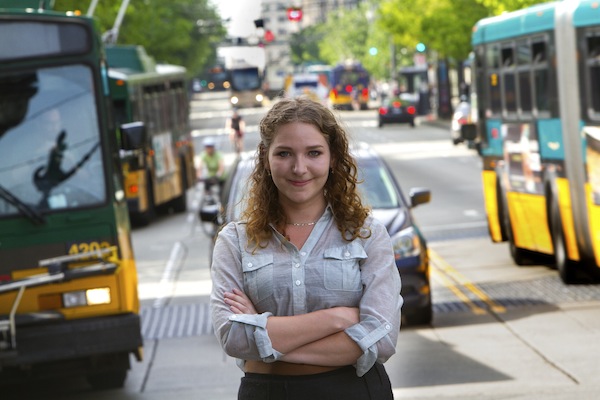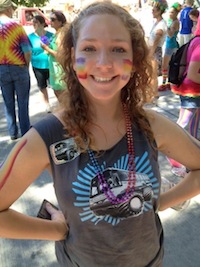
At age 14, Brandy Sincyr, along with her mother and sister, escaped an abusive stepfather and found herself bouncing between shelters and temporary living arrangements. Despite the many challenges of not knowing where she would sleep each night, Brandy graduated from high school — and then went on to earn a political science degree from Seattle Pacific University in June.
Now she’s leveraging her own experience to advocate on behalf of the more than 27,000 homeless students in Washington state. Brandy has worked with the Puget Sound Educational Service District to promote the McKinney-Vento Homeless Assistance Act, which helps homeless students stay in school. Last winter she spoke up about education barriers that homeless youth face while she interned for Sen. Patty Murray in Washington, DC. She’s also connected with Columbia Legal Services, helping to organize an event for service providers in Pierce County, and participating in Youth Advocacy Day in Olympia to give state legislators a young person’s perspective on homelessness.
Many thanks to Brandy for sharing her experiences and reflections on what she calls “the invisible problem” of student homelessness for this interview.
You’ve been quoted saying that your unstable living situation in high school sometimes made you appear to be a “slacker” because you would fall asleep in class and lose track of books; you preferred to let others think you were unmotivated rather than tell them about your family’s economic situation. Did you ever share the fact that you were homeless with school staff?
In relation to my poor performance in school, I never told anyone why I wasn’t doing well and I didn’t want anyone to know, especially not my teachers. I didn’t want them to treat me any different, or feel like I was trying to manipulate them with excuses. I hated being asked directly why I hadn’t turned in an assignment or done well on a test. I usually just apologized and promised to try harder next time.
During my freshman year at Tacoma School of the Arts, my mother bravely told my school that we were homeless and living in Tacoma’s YWCA. After that, a couple of teachers made themselves available to me if I needed to talk or needed help with anything, but I just wasn’t prepared for people to know about my situation. I was still in denial about being homeless.
How could your story be a lesson to educators, students and their parents?
The biggest lesson to be learned is that you never know who is or will become homeless. It could be your friend or your child’s friend who just seems to spend way too much time at your house. Youth homelessness isn’t stereotypical. No one wants to be known as homeless. If it wasn’t for my mom advocating on my behalf in high school, no one would have known I was homeless.
Columbia Legal Services found in the 2011-2012 school year that 1 in 38 students were experiencing homelessness in Washington state, and I am sure that number hasn’t improved. If we want to support teens who are experiencing homelessness, we need to change the way we think about homelessness and the way we discuss it. Instead of asking, “Are you homeless?” we should be asking, “Do you have a place to sleep tonight?” or, “Where are you sleeping tonight?” This takes away some of the stigma of homelessness.
How does your personal experience with homelessness inform your advocacy?
My experiences inform my advocacy by giving me insight from an insider’s perspective. There is a lot I learned from having to go through it. For example, every time someone who is experiencing homelessness opens up and talks about it, they are taking a risk. If it is a teen, they could fear being put in foster care, getting their parents in trouble, or facing the shame of their friends finding out. So, when someone tells you they are homeless, it might be the only time they tell anyone, and that comes with a huge responsibility.
What are some ways our readers could raise awareness about student homelessness and help end it?
This is a huge problem and it can’t be fixed simply, but recognizing that Washington alone has more than 27,000 — or 1 in 38 — students experiencing homelessness is a start. I think we have to challenge ourselves to put aside assumptions in any situation so that we can clearly see what is real. If you’re a teacher, this means not assuming that everyone in your class is going back to a home or parents at the end of the school day or will have a safe, restful night’s sleep. If you’re a parent, this means not assuming that everyone at your child’s birthday party has a stable home. If you’re a community member, this means that the kids that you are running into at the library, the bus, or on the streets doesn’t have a place to sleep that night. It is an invisible problem that is all around us and we have to be open and perceptive to the possibilities that are outside our norms.

You just wrapped up a fellowship with The Washington Bus. How was that experience?
The Washington Bus was a great hands-on approach to local politics and increasing youth participation. We put on a carnival-themed mayoral candidate forum called Candidate Survivor. We packed the Showbox at the Market with more than 700 youth (and youth at heart), and had all of the Seattle mayoral candidates respond to important policy questions while still being true to the carnival theme, which included a talent show. We also spent 10 weeks on the streets of Seattle registering voters at events like Capitol Hill Block Party, Hempfest, and West Seattle Summer Fest. Pretty much anywhere there was youth, the Washington Bus was present registering young voters.
What’s next for you?
I hope to continue my homeless youth advocacy into a career in the nonprofit sector. Washington is an incredibly innovative state and I am excited to contribute my experiences to its future.
We have no doubt that this remarkable young woman will continue to make significant contributions to the welfare of homeless youth. We hope that you, too, will advocate for homeless students and share the information we’ve posted in this Back to School blog series:
“Homeless Students Have Rights” shares the story of Sara’s experience with homelessness in middle school, and explains what rights she had under McKinney-Vento
“How It Really Was” features poetry and artwork about school from homeless youth who intern with Catholic Community Services’s Zine Project
“Flexible Diploma and GED Programs Open Doors for Homeless Youth” is a guest post from YouthCare‘s executive director about helping young people escape the cycle of poverty and homelessness
Tweet them out, post Facebook status updates, shout “27,000 homeless students in Washington” from the rooftops! However you do it, make your voice heard. You can spark change.
Pingback: Public Education System: An Intro to Firesteel’s Homeless Student Blog Series | Faith & Family Homelessness Project()